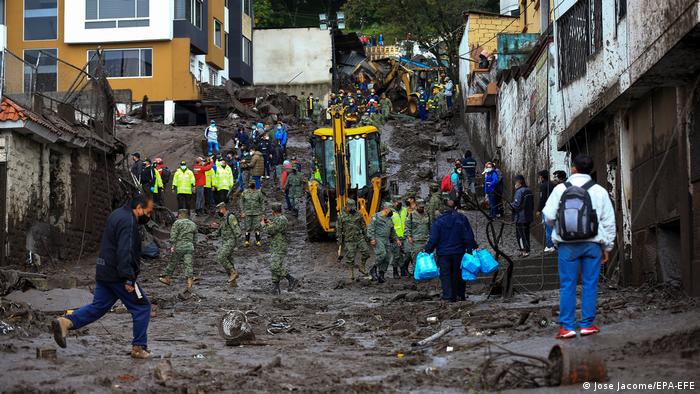
A landslide in the Ecuadorian capital Quito has left at least 24 people dead, city authorities said on Tuesday.
Heavy rains have sparked the worst flooding to hit the country in two decades.
What do we know so far?
So far, at least 48 people have been reported injured from the disaster, according to the Quito Security Department. A dozen people are also still missing.
The landslide was caused by the collapse of a rain-weakened hillside on Monday. The rupture poured mud on homes in the working-class neighborhoods of La Gasca and La Comuna and caused power to be disrupted.
"We saw this immense black river that was dragging along everything, we had to climb the walls to escape," Quito resident Alba Cotacachi told Reuters news agency. She rushed her two young daughters out of her house due to the landslide.
"We are looking for the disappeared," she added.
Mud swept away vehicles, flooded sports field
The mud in some cases was as high as 3 meters (10 feet), sweeping away vehicles, trash cans and other debris. It also flooded a sports field where volleyball players were practicing in front of spectators.
Search operations are still ongoing. Rescue crews have requested silence in the area to hear the screams of people who may be trapped, with Quito police also saying that more bodies could be found.
Much of the city's 2.7 million population have been taken to shelters amid the crisis, with some residents receiving treatment for hypothermia. Authorities have called for three days of mourning to remember the victims.
Ecuadorian President Guillermo Lasso has expressed his condolences to those impacted by the landslide.
"We continue to work in search and rescue, containment actions, psychological care and the transfer of injured people to the hospital," Lasso tweeted.
Ecuador has witnessed torrential rains in recent days.
The rains also triggered the rupture of a oil pipeline in eastern Ecuador last week, which in turn caused a spill that affected the Cayambe-Coca nature reserve and the vital Coca River.
Climate experts say the warming of the earth's atmosphere could be causing heavy rains to become more frequent.